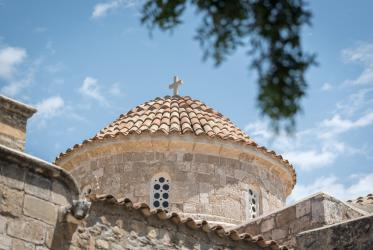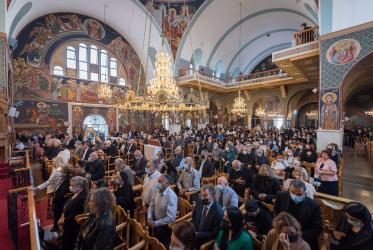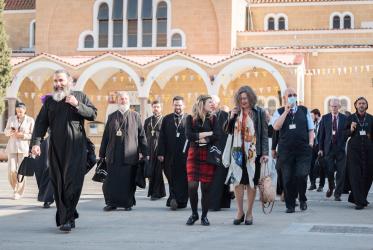by Wesley Granberg-Michaelson
The year is 2054, a thousand years after "formal East-West schism". The place is the international religious zone of the city of Jerusalem. The Pope of the Roman Catholic Church and the Ecumenical Patriarch of the Orthodox Church are co-celebrants for the eucharist at a service which officially heals the rift between the Eastern and Western church after 1000 years of division.
Prophetess Gloria Elijah, secretary general and "pastoral facilitator" of the Community of Christian Communions (CCC), is also participating in this service, which many are calling the most significant event in Christian history since the Reformation. Church leaders from around the world have gathered, while services of "virtual celebration" in several sites around the globe are occurring simultaneously. "Personal participants", who chose to link into this celebration from their individual communications modules, are estimated to create an audience of over 150 million.
Yet, despite its historic significance, today's celebration is being taken almost for granted by Christians in Africa, Latin America, and Asia. Dramatic events in the life of the churches over the past 50 years not only led to today's historic eucharist service, but also reshaped ecumenical relationships and institutions throughout the world.
Some church historians, tracing the roots of ecumenical history since the turn of the century, point to the dialogue between Orthodox and other churches in the former World Council of Churches (WCC) fifty years ago as a turning point. By 2010, the WCC had reorganized itself to represent major Christian groupings, called "streams of conviction and practice", instead of individual member churches. Further, it built direct links with the eight regional councils of churches existing at that time, "re-centring" it staff and resources in these locations. All this created a new framework, which began to nurture wider ecumenical relationships. This was at a time, one must recall, when neither Pentecostal, Evangelical, and the Roman Catholic communities had been included within this so-called "ecumenical" organization.
But what revitalized the mission and image of the old WCC during this period were the "peace armies". This movement, inspired by the vision of Mahatma Ghandi in the mid-twentieth century, emerged almost by accident at the end of a programme called the "Decade to Overcome Violence". In 2011 a group of one hundred young people gathered by the WCC travelled to what was then eastern Turkey, placing themselves in the middle of an armed ethnic conflict as "soldiers of peace" and non-violence. Eighty-nine became martyrs, killed by a missile whose origin was vehemently denied by both sides in the conflict.
But the globe's conscience was touched and outraged by this act. Remarkably, thousands of young people began contacting the WCC volunteering to join such "peace armies". Over the next three years, an estimated 50,000 young people, mostly from churches and Christian federations, were trained and dispatched through efforts co-ordinated by the WCC to offer themselves as non-violent insurgents in locations of conflict throughout the globe. Relatively few died, and mediated political solutions emerged in six such locations, including, most dramatically, in the former Indonesia, and between Armenia and Georgia.
Among the eleven survivors of the initial massacre were an Orthodox seminarian from Romania and a young Catholic priest from Chile. Their words the next day were heard by millions, and will be repeated at today's eucharist in the remarks of Prophetess Elijah: "We came and shed our blood for the name of the peace of Christ. But our churches say we cannot share the body and blood of Christ. That is a heresy we will no longer obey".
In the funerals and services of commemoration which followed, many began openly breaking the existing norms governing eucharistic sharing. This trend of "ecclesiastic disobedience" became a continual problem for church officials in the years, which followed. Theologians returned attention to studies on "the ecumenical significance of baptism" which had been completed earlier by the WCC, with participation from the Vatican, but lacked specific means of implementation and had gone largely unnoticed by the churches.
Meanwhile, the "peace army" initiative eventually took on a life of its own, separating itself from the WCC, and creating an Inter-Faith Co-ordinating Committee with an indirect relationship to United Nations. Yet, this experience of massive ecumenical action for peace had a major impact on how the WCC as well as regional and national councils evolved.
In many respects, the African churches were the most innovative in ecumenical relationships. By 2015, the cause of economic sustainability had created widespread grass roots co-operation between the Pentecostal, "Western protestant", Roman Catholic and "African rooted" churches. Growing networks of self-help projects, co-operatives, and church-related micro-enterprise initiatives were making the churches in several countries the most important vehicles of social and economic infrastructure.
But it took the leadership of Cardinal Mathai from the roman Catholic Church to merge this co-operation into a new "Council of African Churches", established in 2024. By then Africa was recognized as the world centre of Christianity in terms of numerical growth and spiritual vitality. Its new council of churches, so broadly inclusive of the Christian traditions and so deeply engaged in the social and economic challenges of the continent, became a compelling model.
Similar developments emerged in Latin America, as its Catholic bishops pushed the boundaries of their autonomy, and as the dominant Pentecostal and Evangelical churches became increasingly involved in dialogue and co-operative grass roots action with various parts of the Catholic church. Its new "Federation of the Peoples' Churches" was formed in 2027.
This was the same year that Cardinal Mathai was elected as the first African pope of the Roman Catholic Church, taking the name of Pope Stephen. His conservative theological views on doctrinal matters were balanced by his remarkable social and ecumenical involvement in Kenya and Africa. His papacy, along with strong pressure from the models of ecumenical life that had taken root in Africa and Latin America, resulted in reconstituting the WCC.
Regional councils, now constitutionally linked as parts of the former WCC, had been transformed through wider ecumenical participation, and increasingly insisted that the whole of the WCC take on this character. But pouring new ecumenical wine into old wineskins, in the end, seemed very ill advised. At the clear suggestion of Pope Stephen and certain Orthodox and Protestant churches, a new ecumenical structure was born in 2035. Named the "Community of Christian Communions," it included Roman Catholic, Pentecostal, Western Protestant, Orthodox, Evangelical churches and groups as founding members.
Pope Stephen's untimely death in 2038 led to the unexpected election of Cardinal Rivera as Pope Francis, leading to other ecumenical consequences, River, of Hispanic descent, was an author, spiritual leader, and Benedictine called in 2025 from his monastery to lead the archdiocese of New York at the age of 41. For a decade his commitments to simplicity, prayer and hospitality, and the renewal inspired in many parishes, drew global attention. His weekly meditations were read by millions on the wireless web.
But then he returned to monastic life at a Trappist monastery in the mountains of Colorado, serving as their abbot. A hopelessly deadlocked College of Cardinals turned to Rivera as a stunning choice.
When Pope Francis moved out of the Vatican, announcing his plans to "live with the people of the church" in ten different locations of the world over his first two years, this symbolized his commitment to decentralize significant, unprecedented power and authority to regional and national conferences of bishops. His "spirituality of relinquishment" reshaped the understanding of the Bishop of Rome, a process first hinted at by Pope John Paul II at the end of the twentieth century, but not realized until Pope Francis.
This devolution of power on the part of Rome to regional and national bishops was essential in enabling Orthodox churches to make an ecumenical breakthrough. As the CCC, along with regional and national church councils, became more widely inclusive in their membership, Orthodox churches, while remaining faithful, were increasingly is9olated because of their official ecclesiology. While some national settings had embraced a mutual recognition of baptism, in others Orthodox churches remained resistant to such formal declarations.
It took the diplomatic and spiritual initiative of the Ecumenical Patriarch, who as a young person had served as a "steward" at the ninth assembly of the former WCC, to convene a Pan-Orthodox gathering in 2042. This session finally reached a consensus that the CCC as well as regional and national councils/federations of churches could be regarded as "ecclesial reminders" of the one undivided church. This enabled the various Orthodox churches to respond according to "their deepest discernment" at regional and local levels.
The presence and address of Pope Francis at this Pan-Orthodox gathering, as well as the participation as an observer of Prophetess Gloria Elijah - at that time she was "spiritual leader" of the Conference of African Churches - proved to be decisive and prophetic. Twelve years later, after Prophetess Elijah had become the leader of the CCC, these three unique personalities in the Christian world were leading the service of joint eucharist celebration and healing in Jerusalem.
Ecumenical challenges, of course, remain. In China, for instance, the explosive growth of the church - now the fastest in the whole world - has only recently become linked to ecumenical life. The former communist party government eventually collapsed in the early 21st century under the uncontrollable influence of the wireless web, and the dynamism of economic revitalization introduced at that time.
The new "nationalist democracy" which emerged allowed the churches to function freely (a "free market of religion" was the government's slogan). But much of the church adopted a syncretistic mixture of fervent personal faith and individual economic prosperity - not unlike versions, which were popular in America in the late 20th century. Churches were also highly nationalistic, and often suspicious of ecumenical organizations. But by 2045, most had affiliated formally with the CCC, and today, ecumenical links with these fast-growing churches have begun to mature.
Inter-faith relations are now a feature of nearly every regional council as well as the CCC. But two trends have been perplexing. First is the emergence of "Islamic Christians", a rapidly growing movement in many parts of the world. While its insistence on blending key features of these two traditions in one faith and practice has been consistently condemned, its growth has been enormous, especially in northern Africa, the former Indonesia, and several parts of the Middle East, and in America. The CCC will have to make a decision about whether it will accept these religious communities as full participants within the next few years. Many, but not all, Orthodox and Evangelical churches remain strongly opposed.
Additionally, the emergence of countless "virtual religious communities" formed exclusively as "affinity groups" within the wireless web pose additional ecumenical dilemmas. While highly creative theologies, often blending Christian themes with various cosmologies and astrological revelations, it is challenging to determine which are and are not part of the "historic Christian confession".
Nevertheless, today's celebration is widely regarded as an historic breakthrough in the history of Christianity. Martyrs, theologians, activists, and charismatic spiritual leaders have all played roles in bringing the church to this point. But perhaps the words today of Prophetess Gloria Elijah give the best summary: "Who could ever doubt that this is what God's Spirit has always intended? How can we ever adequately confess for a millennium of ecumenical unfaithfulness? We need not. Because always, God is victorious. Even over the sins of God's church. And only because of God's selfless, suffering, reconciling, embracing love for this world."




